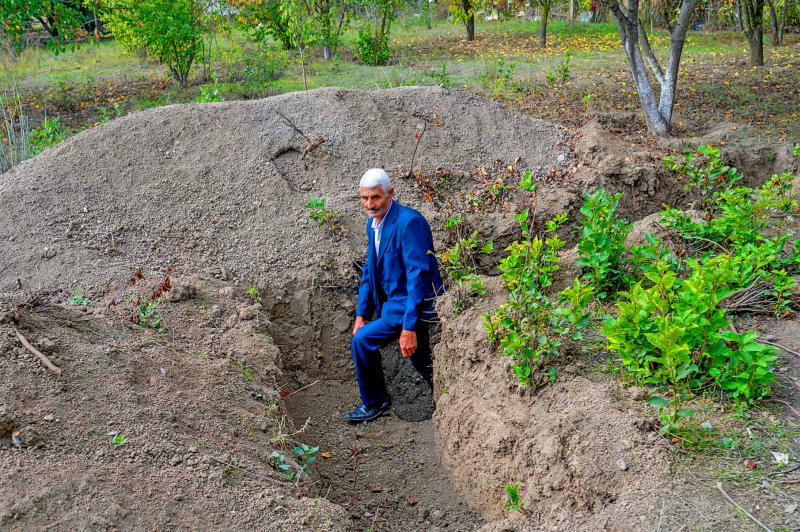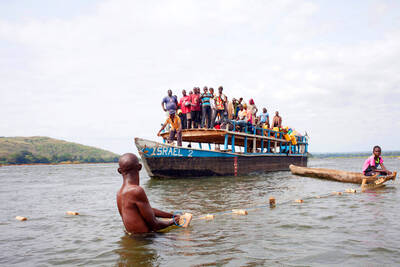Bayran Khalilov knew trouble was brewing when Azerbaijani government men came to dig trenches in his backyard facing the mountains of Nagorno-Karabakh.
The grizzled veteran of the original Karabakh conflict between ethnic Armenians and Azerbaijanis that killed 30,000 in the 1990s knew the shells were about to start falling again.
“These men came about one or two months ago and started digging,” he said in front of an L-shaped trench as wide as his narrow frame and deep enough to cover him standing.

Photo: AFP
“They said it was for your own basic safety,” the 68-year-old told a team of reporters that was granted access to frontline areas by the Azerbaijani government. “But we all then knew something was about to start.”
The origins of a flareup in fighting over Nagorno-Karabakh that has now killed hundreds and threatens to involve regional powers Turkey and Russia are hotly contested and difficult to independently verify.
Both sides accuse the other of striking first on Sept. 27 over the ethnic Armenian region of Azerbaijan.
Khalilov’s account suggests that at least some in Azerbaijan’s border regions were preparing for heavy fighting weeks before it broke out.
However, none of the people reporters spoke to in the frontier village of Bakharly knew what prompted Azerbaijani officials to start preparing trenches along the front.
“We are very grateful they did,” Khalilov said.
The shelling is all around Bakharly. The dusty settlement at the foot of the Caucasus mountains once housed 800 families displaced by decades of strife. Only about 100 men remain in Bakharly today.
Many who have stayed struggle to find the right words to explain what keeps them in the settlement under the shells.
“Why we are here — that is the most important question,” Sakhib Askerov said after showing off the trench dug behind his simple wooden house.
“Our boys are up there fighting,” he said of the mountains.
“By staying here, we feel that we are also fighting, holding on to our land,” the 66-year-old said.
Bakharly represents the outer reaches of Azerbaijani control in the central section of the conflict zone. The fields beyond it are part of a no-man’s land of the informal front.
Mikhail Ismailov walks 2km along these fields daily to buy a few flatbreads that he carries back home in a plastic bag.
He said the village endures “countless” bouts of shelling each night.
“This morning, they shelled our soldiers. Luckily they survived, with God’s help. I always watch our soldiers from here,” he said from his backyard.
“Every evening, we sit here and watch the fighting, first the shells coming from the Armenian side and then those going out from our side,” he said.
Armenian forces insist that they only return fire and otherwise try to respect a humanitarian ceasefire struck in Moscow on Saturday.
However, the fighting along the front is omnipresent and becomes especially fierce at night.
“Every evening when the shelling starts, we come here to stay safe, so that we don’t die,” Ismailov said, while showing reporters the inside of his trench.
“There is no fear. Our soldiers are fighting over there — why should I be scared here. We shouldn’t be scared,” he said.
However, fellow villager Akif Kasymov said some of the men do leave when the fighting gets too heavy.
Many of the houses along his gravel road stand with their roofs sheered off completely and their walls caved in.
Some of the more intact homes still have unfinished meals left on tables — telltale signs of families fleeing from sudden attacks.
“If it’s not heavy shelling, we stay,” Kasymov said. “We stay as long as we can.”

‘IN A DIFFERENT PLACE’: The envoy first visited Shanghai, where he attended a Chinese basketball playoff match, and is to meet top officials in Beijing tomorrow US Secretary of State Antony Blinken yesterday arrived in China on his second visit in a year as the US ramps up pressure on its rival over its support for Russia while also seeking to manage tensions with Beijing. The US diplomat tomorrow is to meet China’s top brass in Beijing, where he is also expected to plead for restraint as Taiwan inaugurates president-elect William Lai (賴清德), and to raise US concerns on Chinese trade practices. However, Blinken is also seeking to stabilize ties, with tensions between the world’s two largest economies easing since his previous visit in June last year. At the

UNSETTLING IMAGES: The scene took place in front of TV crews covering the Trump trial, with a CNN anchor calling it an ‘emotional and unbelievably disturbing moment’ A man who doused himself in an accelerant and set himself on fire outside the courthouse where former US president Donald Trump is on trial has died, police said yesterday. The New York City Police Department (NYPD) said the man was declared dead by staff at an area hospital. The man was in Collect Pond Park at about 1:30pm on Friday when he took out pamphlets espousing conspiracy theories, tossed them around, then doused himself in an accelerant and set himself on fire, officials and witnesses said. A large number of police officers were nearby when it happened. Some officers and bystanders rushed

Beijing is continuing to commit genocide and crimes against humanity against Uyghurs and other Muslim minorities in its western Xinjiang province, U.S. Secretary of State Antony Blinken said in a report published on Monday, ahead of his planned visit to China this week. The State Department’s annual human rights report, which documents abuses recorded all over the world during the previous calendar year, repeated language from previous years on the treatment of Muslims in Xinjiang, but the publication raises the issue ahead of delicate talks, including on the war in Ukraine and global trade, between the top U.S. diplomat and Chinese

RIVER TRAGEDY: Local fishers and residents helped rescue people after the vessel capsized, while motorbike taxis evacuated some of the injured At least 58 people going to a funeral died after their overloaded river boat capsized in the Central African Republic’s (CAR) capital, Bangui, the head of civil protection said on Saturday. “We were able to extract 58 lifeless bodies,” Thomas Djimasse told Radio Guira. “We don’t know the total number of people who are underwater. According to witnesses and videos on social media, the wooden boat was carrying more than 300 people — some standing and others perched on wooden structures — when it sank on the Mpoko River on Friday. The vessel was heading to the funeral of a village chief in